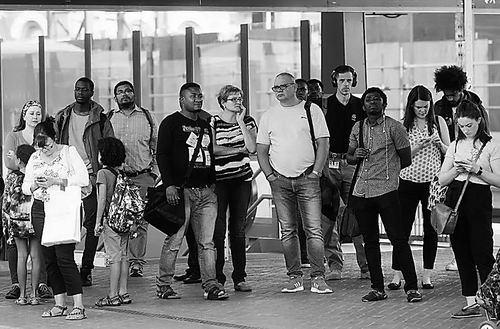

People's happiness levels change as they age. (Image: Simon Dawson/Bloomberg)
People used to be deeply dissatisfied with their lives in middle age, creating a "hump of unhappiness" between the more satisfied years of youth and old age. But a study published on August 27 in PLOS ONE finds that this is no longer the case.
Alex Bryson of University College London, the study's corresponding author, noted that the proverbial "hump" has disappeared, not because middle-aged people are happier, but because younger people are less happy than they once were. "We found that stress continues to rise among people under 40, and the younger they are, the faster it rises. This suggests that stress is shifting over time, with younger people becoming increasingly miserable," Bryson said.
Previous research based on data from 145 countries has shown that people are happiest in their early 30s and early 70s, with unhappiness peaking around 50. This trend has even been observed in orangutans and chimpanzees. However, using data from two mental health surveys conducted in the United States and the United Kingdom, Bryson and his colleagues noticed that the "unhappiness hump" appears to have disappeared.
To test whether this is a global phenomenon, researchers analyzed data from a mental health study called "Global Minds" conducted in 2020 among nearly 2 million people in 44 countries, including the United States and the United Kingdom. They found that in every country participating in the study, unhappiness decreases with age, and the "hump of unhappiness" has been replaced by a gradually downward curve.
So are middle-aged people happier now than they were before? "Absolutely not," Bryson says. "The middle-aged group is in the middle, and things haven't changed that much. All the changes are happening at the lower end of the age distribution."
Bryson stated that this emerging trend is most pronounced in high-income, English-speaking countries like the UK and the US, and least pronounced in Africa, where internet penetration is low. For example, in Tanzania, where only 32% of the population had internet access in 2022, young people who were not online were significantly happier than those who were. He said further research could help explain these findings.
Bryson believes that the decline in young people's happiness may be due to a variety of factors, including increased use of social media, the isolating effects of epidemic quarantine measures, and difficulty in accessing mental health services.
Related paper information: https://doi.org/10.1371/journal.pone.0327858
(Original title: "Middle Age Is No Longer the Unhappiest Time")
urlifpnigzkdykdsuyluzfdfgxpgvk
fiwskkttqgymvnowhiilxkdlevnfgh